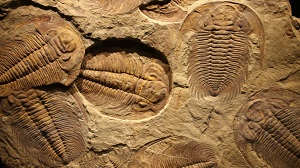
Fossils are remnants of organisms that died millions of years ago. They can provide information about organisms that we may not otherwise know.
Fossils can be useful items to study for several reasons. For instance, they can indicate how animals lived and what they ate in the past. Scientists study dinosaur droppings for evidence of the animals' diet, for example.
Fossils form in many different places. For fish, fossils form in seas, lakes, rivers, and other bodies of water. The process of fossilization for fish takes multiple steps: first, the soft parts of a fish rot. Then, its shell is buried in mud. Over time, this mud turns into rock, after which the shell turns into rock, too.
Materials that break apart slowly are more likely to become fossils. In fact, decomposing materials can take millions of years to fossilize completely. For land animals, body parts such as teeth, bones, horns, claws, and shells decompose especially slowly. Plant materials like bark, seeds, and cones break down slowly, too.
Scientists discover many other interesting things when studying fossils. Besides learning about what fossilized animals ate, they can learn where these animals lived and how old they were when they died. Now, fossils are exhibited in museums for ordinary people to see and evaluate for themselves.
Fossils tell us a lot about our past and the creatures that walked the Earth before we humans ever did.
[Source:
Simpson Street Free Press Archives
]

